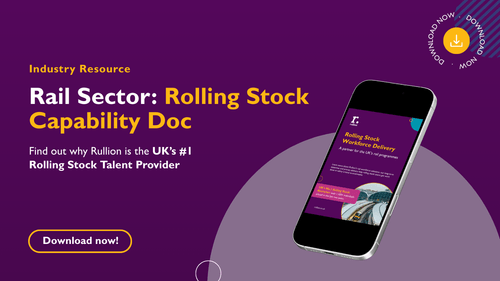Pride Conversations: Why They Still Matter
This Pride Month, the Musketeers - a passionate group of people from all backgrounds and departments of Rullion focused on Equity, Diversity & Inclusion - wanted to share something a little different.
As a fully remote company, it’s more important than ever to keep learning and developing in ED&I, making sure every voice is heard no matter where we work from.
Demi Pilavakis, Senior Business Services Administrator and proud Musketeer, offers a personal reflection on what LGBTQ+ progress looks like from her home in Cyprus. Her honest perspective reminds us why it’s so important to keep the conversation about Pride going, no matter where we are in the world.
Reflecting on LGBTQ+ Progress from Cyprus
While we continue to celebrate the progress made in the UK, I felt it was important to reflect on the ongoing challenges that many LGBTQ+ people still face, especially from my perspective living in Cyprus, where acceptance and visibility can be very different.
Having recently moved to Cyprus, I’ve observed stark cultural differences in many areas of life. Cyprus is more conservative than the UK, influenced by its strong religious foundations, particularly the Orthodox Christian faith. These beliefs shape societal views on sexuality, often leading to challenges for the LGBTQ+ community.
Cyprus’s division into the predominantly Turkish Cypriot north and Greek Cypriot south adds complexity. Despite differing religions and languages, both communities share conservative cultural values.
This contrast made me start to compare Cyprus’s and the UK’s advancements in LGBTQ+ rights. I am not part of the community, but support all humans and their rights to be authentically themselves in society, if they are not harming others.
Small Freedoms, Big Differences
In the UK, same-sex couples can live openly, express affection publicly, and access a variety of LGBTQ+ spaces, including bars and clubs for their communities, all protected by law. Although, I have heard in recent years these are closing due to rising costs. These freedoms, though commonplace in the UK, are harder to exercise in Cyprus, especially for locals.
Legally, Cyprus protects LGBTQ+ rights, and expatriates I have personally spoken with often feel freer due to fewer familial expectations. However, for Cypriots with traditional families, there’s a strong sense of shame associated with being open about their sexuality. This shame stems not from internal conflict but from the fear of bringing embarrassment to their families.
In smaller, close-knit societies like Cyprus, everyone knows everyone, intensifying this pressure. The emphasis on family values and maintaining a certain image can delay individuals from coming out until later in life.
Making progress with Pride
Although Cyprus is making progress with a Pride parade and increasing visibility, the cultural and religious landscape still poses challenges. For instance, Paphos, with a population of approximately 35,961, has only one gay bar, operational since 1933. In contrast, Sitges, near Barcelona, with 20,000 residents (which increases to 60,000 over summer), boasts 20 gay bars and LGBTQ+-friendly hotels. That is not to say there aren’t gay-friendly establishments on the island, just not so many created specifically for the LGBTQ+ community.
Many younger Cypriots returning from studying abroad bring back more open-minded views. Exposure to multicultural environments fosters acceptance, but returning to a smaller, closely monitored community can feel stifling.
Some of my LGBTQ+ friends here feel freer in cities like Athens, not because of a vastly different culture but due to the anonymity larger populations offer. In Cyprus, gossip travels quickly, and even distant acquaintances can pose judgment.
Keeping Pride Visible All Year
In the UK, we might take our freedoms for granted. Perhaps our quicker progress is due to being a more multicultural society, where diverse norms have led to greater acceptance. There will always be bullying and close-minded people in the UK too. Cyprus, though progressing, is doing so at a slower pace, and many still feel compelled to conceal parts of their identity to protect their families from perceived shame.
This isn’t about being ashamed of ourselves; it’s about not wanting to bring shame upon our parents. This recurring theme in conversations highlights the strength of family ties but also underscores the work needed to create a truly open and safe environment for all.
I reached out to the LGBTQ+ Cypriot Diaspora community to review this piece. Their insights are invaluable. They pointed out that Cyprus banned conversion therapy in 2023 - a move the UK has yet to make. The law also prohibits advertising and penalises guardians who refer minors to such practices.
As an EU member, Cyprus repealed British colonial anti-LGBTQ+ laws in 1998.
Hope and Activism in Cyprus
Activists on the island are making meaningful changes. Notable organisations include:
-
Accept – LGBTI Cyprus: Founded in 2011 in Nicosia, focusing on legal reforms, public campaigns, education, and support. Organisers of the official Cyprus Pride Parade.
-
Kuir Kıbrıs Derneği (Queer Cyprus Association): Established in 2007 in North Nicosia, concentrating on LGBTQIA+ rights, strategic litigation, and community support. Played a role in decriminalising homosexuality in the north in 2014.
-
Queer Collective CY: A grassroots group active since 2020, emphasising queer art, cultural events, and intersectional activism. Prioritises safe, expressive spaces over formal advocacy.
Cyprus still has work to do in terms of visible social options for the community and fostering a society that balances its religious heritage with acceptance of all communities. However, change is underway. Initially, I viewed Cyprus as lagging, but I’ve witnessed positive developments in a short time.
Why This Matters at Rullion
Supporting Pride shouldn’t be limited to one week or month. For me, it’s about staying aware of what freedom, safety and belonging look like for our colleagues, wherever they live and work.
In Cyprus, I’m lucky to work alongside others in our Rullion family, including our CEO James Saoulli, who shares a commitment to ED&I and people-first values. These conversations remind me that we must keep showing up, listening, and learning (even when progress can feel slow).
Our people power everything we do at Rullion. That’s why we support the Musketeers, share real voices and stories, and stay focused on unlocking potential for everyone, everywhere.
Unlock Your Potential with Rullion
Supporting diversity, equity, and inclusion goes beyond the workplace, it’s at the heart of how we help candidates find roles where they can truly thrive. Whether you’re starting a new journey or looking for the next opportunity in critical infrastructure, discover how Rullion’s people-first approach can help unlock your full potential.
Explore current opportunities and take the next step in your career with us: Jobs at Rullion.
Written by Demi Pilavakis, Senior Business Services Administrator and Musketeer at Rullion.





